Cooking Instructions For A Turkey
Roasting Tips
- Roasting a turkey breast-side down for the first hour will keep the turkey moist. Turn turkey over after first hour to finish cooking.
- Celery layered at the base of a roasting pan adds flavor to the juices for delicious gravy.
- If turkey is browning too quickly, make a tent out of aluminum foil and place over the top of the bird.
- Rub a stick of butter over the turkey before roasting for a more moist turkey.
- Place sliced lemon, or a whole onion into the cavity of a turkey while roasting, the flavor will create a tasty juice for gravy.
- If you have chosen to use a roasting bag, open the bag for the final 15 to 20 minutes of roasting to allow the skin of the turkey to crisp.
| Place the turkey breast side up on a cooking rack in a shallow roasting pan and place the pan in the center of the lowest rack of a preheated oven. | |
Roast the turkey uncovered at a temperature ranging from 325°F to 350°F. Higher temperatures may cause the meat to dry out, but this is preferable to temperatures that are too low which may not allow the interior of the turkey to cook to a safe temperature. Some cooks prefer to roast the turkey at temperatures as high as 450°F to 500°F for the first 30 minutes to brown the surface and then reduce the heat to 325°F. It is important to keep the oven door closed as much as possible while the turkey is roasting to maintain a constant temperature in the oven.
| Basting a turkey provides a crispy, golden skin, but it does not add moisture or flavor to the interior of the turkey. Basting should be kept to a minimum so that the oven door is not opened too often. The more times the oven door is opened, the longer the cooking time will be due to loss of heat. | | |
| Aluminum foil can be tented over the turkey near the end of the cooking time to keep the skin from becoming too brown. | 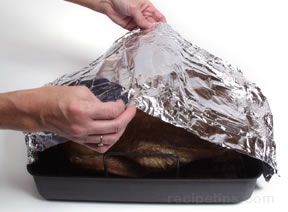 | |
| Use a meat thermometer to determine the proper doneness, which is at least 170°F for the breast and 180°F for the thigh. After removing the turkey from the oven, the temperature of the meat will increase by about 5° as the turkey rests. It is important to not let the turkey overcook, because the breast meat may quickly dry out. | 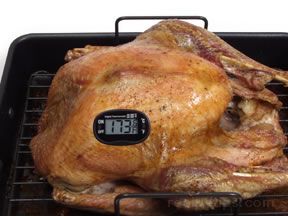 | |
| After removing the turkey from the oven and before carving, allow the turkey to rest at least 20 minutes so that the juices settle within the meat, which will provide the meat with more flavor and tenderness and will also make carving much easier. More or less time may be allotted depending on the size of the turkey. Large lifting forks, like those shown in the picture at the right, or other types of turkey lifters should be used to remove the turkey from the roasting pan. After the turkey is placed on a large cutting board, it can be tented with aluminum foil to retain the heat while it is resting. | 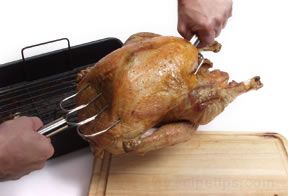
|
Approximate Roasting Times
Whole Turkey Cooked at 325º
| Weight | 8 to 12 pounds | 12 to 14 pounds | 14 to 18 pounds | 18 to 20 pounds | 20 to 24 pounds | 24 to 30 pounds |
| Unstuffed | 2¾ to 3 hours | 3 to 3¾ hours | 3¾ to 4¼ hours | 4¼ to 4½ hours | 4½ to 5 hours | 5 to 5¼ hours |
| Stuffed | 3 to 3½ hours | 3½ to 4 hours | 4 to 4¼ hours | 4¼ to 4¾ hours | 4¾ to 5¼ hours | 5¼ to 6¼ hours |
Oven-Safe Bag
The preparation and roasting steps are identical to the steps used for preparing and roasting a turkey without an oven bag except for the following additional steps:
- Add a small quantity of flour to the bag and shake it to coat the inside of the bag.
- Place the turkey inside the bag and close the opening with the twist tie provided.
- A few holes should be punctured in the bag to allow some steam to escape during the roasting process.
The oven-roasting bag keeps the turkey very moist and it speeds up the roasting time. The following cooking times can be used as a guideline for an unstuffed turkey roasted in an oven bag in a 350°F conventional oven. An additional 30 minutes or more may be required for a stuffed turkey. The only true gauge for determining proper doneness is with a meat thermometer. The breast must reach an internal temperature of 170°F and the thigh must reach 180°F.
| 8 to 12 pounds | 12 to 14 pounds | 14 to 18 pounds | 18 to 20 pounds | 20 to 24 pounds | 24 to 30 pounds |
| 1½ to 2 ¼ hours | 2¼ to 2¾ hours | 2¾ to 3½ hours | 3½ to 4 hours | 4 to 4½ hours | 4½ to 5 hours |
Safety First…
Using a thermometer is the only safe way to be assured that food has reached a temperature high enough to destroy harmful bacteria. The following are guidelines to safeguard your friends and family during the holiday season:
- Turkey must reach an internal temperature of 185º F
- Insert a fork into the thigh or breast of a turkey, if juices are clear the turkey is fully cooked
- Do no refreeze thawed poultry
- Within 2 hours of the start of your meal, all perishable foods must be refrigerated
- If you cook a turkey that comes with a pop-up timer, the cooking process can be almost foolproof. However, if you stuff the turkey, you still need to use a meat thermometer to check the temperature of the stuffing to make sure it has reached a minimum temperature of 165°F.
- Leftover stuffing that was originally cooked inside the turkey and has been removed should be reheated to a minimum temperature of 165°F.
- Stuffing that is placed inside the turkey is often undercooked because many cooks do not allow for the extra cooking time required for a stuffed bird. This increases the chances of food poisoning.
- The meat near the bones of a turkey (or any poultry) may still look a bit pink even if a meat thermometer indicates that the turkey is fully cooked. This is because younger turkeys have bones that are more porous than older turkeys, which allows red pigment to leach out from the bones to the nearby meat during the cooking process. The turkey is safe to eat as long as the proper internal temperature has been reached and the juices run clear.
Meat Thermometers
A meat thermometer should be used to verify that the turkey meat has reached the proper doneness. An ovenproof thermometer can be placed into a whole turkey and remain there throughout the roasting process. An instant read thermometer can be used to check the temperature of the turkey, but it cannot be left in the bird during cooking because it is not heatproof. Some whole turkeys are sold with pop-up timers that indicate when the turkey is fully cooked, but a meat thermometer is still the most reliable tool for determining the proper doneness.
In order to make sure that a meat thermometer is accurate, it can be placed into water and ice for about 5 minutes and the temperature should read 32°F. For the most accurate measurement, the stem should be inserted about 2 ½ inches into the ice water and should not be allowed to touch the sides of the container. If the temperature does not register 32°F, the thermometer can be adjusted with a setscrew usually found on the back of the dial.
Cooking Instructions For A Turkey
Source: https://www.recipetips.com/kitchen-tips/t--644/roasting-a-turkey-turkey-cooking-times.asp
Posted by: stephanbuturears.blogspot.com

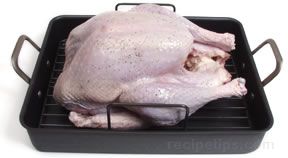
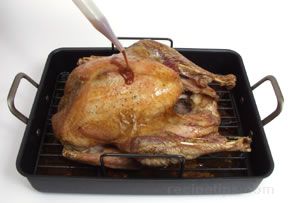
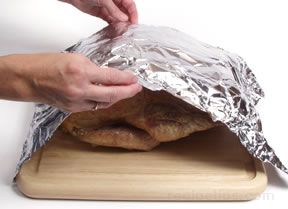
0 Response to "Cooking Instructions For A Turkey"
Post a Comment